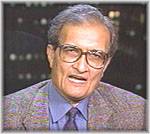
Niranjana Iyer is an Ottawa-based writer and book reviewer, whose work has appeared in The Missouri Review, The Smithsonian Magazine, World Literature Today, and SmokeLong Quarterly, amongst other publications. She blogs at http://niranjana.wordpress.com .
Identity and Violence: The Illusion of Destiny
Author: Sen, Amartya
Publication date: Hardback, Feb. 2006; Paperback: Jan. 2007
Publisher: W. W. Norton
ISBN: 0393329291
The notion of a "clash of civilizations," first made famous in Samuel Huntington's 1996 work "The Clash of Civilizations and the Remaking of the World Order" has gained increasing currency today. In essence, the theory presumes religious/cultural identity to be the keystone upon which cultures are differentiated; the world is accordingly categorized into "Islamic civilization," "Hindu civilization," "Buddhist civilization," and so on, which clash with each other.
 |
Amartya Sen embarks upon a passionate debunking of such classifications of identity in his 2006 work "Identity and Violence: The Illusion of Destiny". Viewing a person's identity through the lens of religion alone is fundamentally flawed, he explains, for it ignores the many other equally strong identities that a person might bear. Most people have plural identities; we define ourselves not just by religion, but also by gender, nationality, class, profession, and much more.
Sen himself is perhaps the best illustration of his argument. Born a Hindu, in a part of India that is now Bangladesh (a predominantly Muslim country), he was educated at Cambridge, England, and is currently a professor at Harvard. Sen describes himself as "at the same time, an Asian, an Indian, a Bengali with Bangladeshi ancestry, an American or British resident, and economist, a dabbler in philosophy, an author, a Sanskritist, a strong believer in secularism and democracy, a man, a feminist, a heterosexual, a defender of gay and lesbian rights, with a non-religious lifestyle, from a Hindu background, a non-Brahmin, and a non-believer in the afterlife…" [pg 19] According to Huntington's theory, Sen is primarily to be viewed as Hindu; that he won the Nobel Prize for Economics in 1998 is mere trivia.
Of particular topical interest is Sen's deconstruction of the idea that a clash between the "Islamic civilization" and "western civilization" is inevitable. Sen begins by unraveling the notion that tolerance, scientific thinking and democracy are uniquely Western ideas that Islam intrinsically opposes. He cites historical examples from Africa and Asia spanning the past three millennia to illustrate the same, such as the case of Maimonides, the Jewish philosopher who, "forced to emigrate from an intolerant Europe in the twelfth century", found refuge with King Saladin (yes, that Saladin of the Crusades fame) in the Arab world.
Sen makes the critical point that resistance to "Westernization" often takes on the form of resisting ideas seen as "Western"—even though such ideas have flourished in many non-Western societies for centuries. To acknowledge the intellectual achievements of the Occident, of the traditions of secularism and tolerance that flourished in many "Islamic civilizations" intuitively seems the smart thing to do, for to emphasize a schism between Islam and the West is to champion the view of Islamic fundamentalists, who would indeed favor suppressing "all other identities of Muslims in favor of being only Islamic." There's a common sense appeal to Sen's thesis that makes the book, for all its erudition, easy reading.
It is, of course, a luxury to able to choose one's identity. This reviewer is, at the same time, a South Asian, a closet Hall and Oates listener, a resident of Canada who has lived in India, Britain and America, with a non-religious lifestyle, a writer and a vegetarian, who dreams of being stranded in an elevator with Gael Garcia Bernal for an hour or two. Much as I wish my writerly persona soared over all my other identities (cue people whispering, "She looks intellectual" while I buy detergent at Canadian Tire), race is inevitably my primary identifier in the West.
Sen offers no solutions to such inevitabilities. "Identity and Violence" is ultimately a plea for inclusion and understanding, and while the book will comfort humanists, it lacks the heft to convert the zealot who clings to a "them versus us" vision of the world. Furthermore, Sen doesn't address the scenario of individuals who choose to define themselves solely through religion, and who voluntarily discard all other identities as irrelevant. In spite of these omissions, this book stands as a thoughtful and necessary comment on our times from a man of great intellect and compassion; I for one would like to thrust a copy of Sen's work into the hands of every airport official in North America.